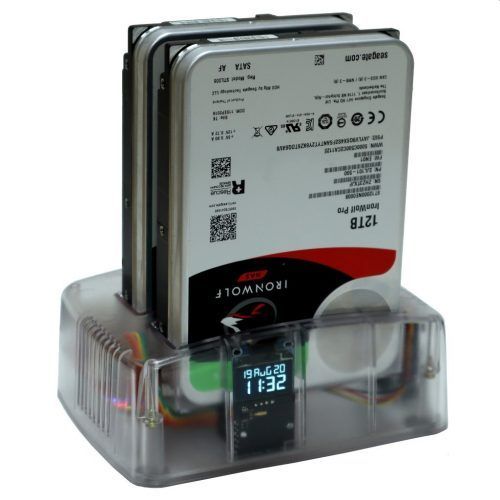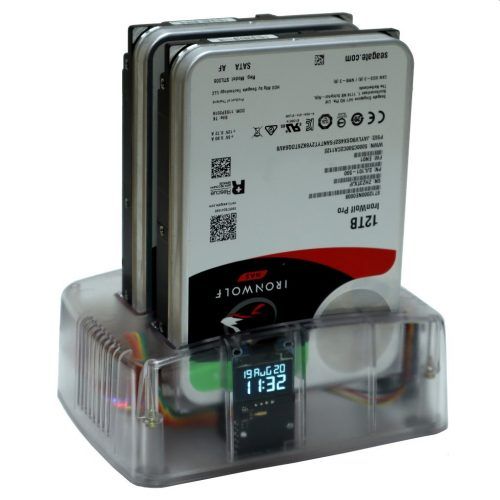Interesting hardware for Cloudron: ODROID-HC4
-
- https://liliputing.com/2020/10/network-attached-storage-nas-devices-can-be-useful-for-folks-looking-to-back-up-data-from-multiple-computers-set-up-a-home-media-server-or-even-a-self-hosted-alternative-to-google-drive-dropbox.html
- https://forum.odroid.com/viewtopic.php?f=29&t=40609
USD 65.00 and Ubuntu preinstalled...
Hardkernel’s ODROID-HC4 dual-bay NAS is set to go on sale next week for just $65 and up.

The system is powered by an Amlogic S905X ARM Cortex-A55 quad-core processor and 4GB of RAM. It features a Gigabit Ethernet port, HDMI 2.0 for connecting to an external display, a microSD card reader, a USB 2.0 port, two SATA connectors for storage, and an IR receiver for an optional remote control.The $65 starting price gets you a basic ODROID-HC4 board and pre-assembled case shell, while you can also pay $75 for a version with a 1 inch OLED display and real-time clock pre-installed and visible on the front of the case.
Unlike most NAS systems, the ODROID-HC4 has what Hardkernel calls a “toaster” form factor, where the 2.5 inch or 3.5 inch drives can be inserted into slots in the case and they’re exposed to open air rather than hidden away inside a shell of plastic or metal.
That should help keep the NAS cool, but you also may want to keep the ODROID-HC4 in an area where it’s not likely to collect dust or have coffee spilled on it (arguably a good idea when finding an ideal location for any computer). The ODROID-HC4 has a passive heat sink and a hydraulic bearing fan, but it should be relatively quiet, with a noise level of 23.9 dBA.
Hardkernel says the system comes with an Ubuntu Linux image pre-installed, but it should also support third-party software including CoreElec, OpenMediaVault, and Android. OS images will be posted on the ODROID-HC4 Wiki in the coming weeks.
BTW: A hardware category for this forum could be nice... I successfully run Cloudron at home on a ASRock Beebox (https://www.asrock.com/nettop/Intel/Beebox Series/index.asp)
-
https://forum.cloudron.io/topic/3107/cloudron-on-a-raspberry-pi/74
@malvim has already made good progress on this front with a Raspberry Pi. I think once it runs on the Pi, installing it on any other ARM box will be trivial.
-
Oh, by the way, some hardware discussion might really be nice for people that run their cloudrons at home.
So, for NAS-type things, would we be able to run a cloudron instance PLUS exporting volumes via NFS/Samba/whatever? You guys think we'd have problems with setting up these external services? I know cloudron has config files to open ports on the firewall, but is that enough? I also know it's not recommended practice to run other services that are not cloudron-related on the same box.
I don't have much knowledge about how these things are set up, but would we be able to, say, with some volume-mounting-magic (which we know is coming to cloudron soon-ish), run these as cloudron apps? Say, a "NAS" or "export volumes" app, wich would mount the volumes inside the docker container and expose the services the regular cloudron way?
-
Oh, by the way, some hardware discussion might really be nice for people that run their cloudrons at home.
So, for NAS-type things, would we be able to run a cloudron instance PLUS exporting volumes via NFS/Samba/whatever? You guys think we'd have problems with setting up these external services? I know cloudron has config files to open ports on the firewall, but is that enough? I also know it's not recommended practice to run other services that are not cloudron-related on the same box.
I don't have much knowledge about how these things are set up, but would we be able to, say, with some volume-mounting-magic (which we know is coming to cloudron soon-ish), run these as cloudron apps? Say, a "NAS" or "export volumes" app, wich would mount the volumes inside the docker container and expose the services the regular cloudron way?
-
I know the guys over at OpenEBS.io in case a container storage solution integration is needed.



